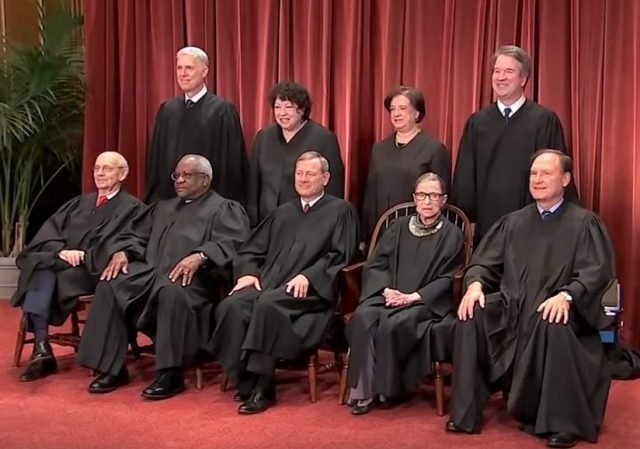Supreme Court stays subpoenas for Trump financial records, will hear all three cases

The Supreme Court today agreed to hear three cases involving attempts by Democrats to subpoena Trump’s financial records. Two of the case involve House committee subpoenas and one case involves a Manhattan District Attorney grand jury subpoena.
The Court also stayed enforcement of the subpoenas pending argument and decision.
19-635 TRUMP, DONALD J. V. VANCE, CYRUS R., ET AL.The petition for a writ of certiorari is granted. The case will be set for argument in the March 2020 argument session.19-715 ) TRUMP, DONALD J., ET AL. V. MAZARS USA, LLP, ET AL.19-760 ) TRUMP, DONALD J., ET AL. V. DEUTSCHE BANK AG, ET AL. (19A640)The petition for a writ of certiorari in No. 19-715 is granted. The application (19A640) for stay presented to Justice Ginsburg and by her referred to the Court is granted, and it is ordered that the mandate of the United States Court of Appeals for the Second Circuit, case No. 19-1540, is hereby stayed pending further order of the Court. In addition, the application is treated as a petition for a writ of certiorari, and the petition is granted. The cases are consolidated, and a total of one hour is allotted for oral argument. The cases will be set for argument in the March 2020 argument session.
MORE TO FOLLOW
Politico provides this short guide to the cases:
The House-related cases the justices agreed to take up stem from a barrage of subpoenas the House issued in April, when the Oversight and Reform Committee demanded eight years of Trump’s financial records from the international accounting firm Mazars, and the Intelligence and Financial Services committees sought additional records from two of Trump’s major lenders, Deutsche Bank and CapitalOne.A divided federal appeals court panel in Washington upheld the Oversight panel’s subpoena in October, issuing a 2-1 decision endorsing a broad congressional right to information that could inform legislation.
House lawyers said the details on Trump’s financial dealings could help efforts to tighten financial disclosure laws and to regulate what so-called emoluments presidents and other officials can accept from foreign sources.
Trump’s attorneys argued that the House’s claims about potential legislation were just pretexts and that lawmakers were actually embarking on a impermissible, law-enforcement-type effort to try to prove that Trump had committed crimes.In December, another divided federal appeals court in New York issued a decision blessing the subpoenas to Deutsche and CapitalOne, but ordering a lower court to set up a process to consider holding back sensitive personal information not relevant to the House probe.The banks have indicated they don’t currently have copies of Trump’s tax returns, but Deutsche said it does have some returns for two Trump family members.The third legal fight the justices agreed to wade into pits Trump against Manhattan District Attorney Cy Vance Jr. A grand jury investigating potential financial and tax-related crimes issued subpoenas to the Trump Organization and to Mazars, prompting Trump to file suit to block the effort.A unanimous 2 nd Circuit panel backed that subpoena last month.
While the House subpoenas and grand jury subpoena present distinct issues, there is a common issue I expect to focus on: Does a president have some personal protection, while in office, from judicial and quasi-judicial process related to the president’s personal life instigated by political opponents? If the answer is no, then the floodgates of subpoenas could paralyze a president’s ability to function as president. While that doesn’t necessarily resolve the issues completely, it would inform how broadly the Justices construe legislative and grand jury authority as to a sitting president.
CLICK HERE FOR FULL VERSION OF THIS STORY